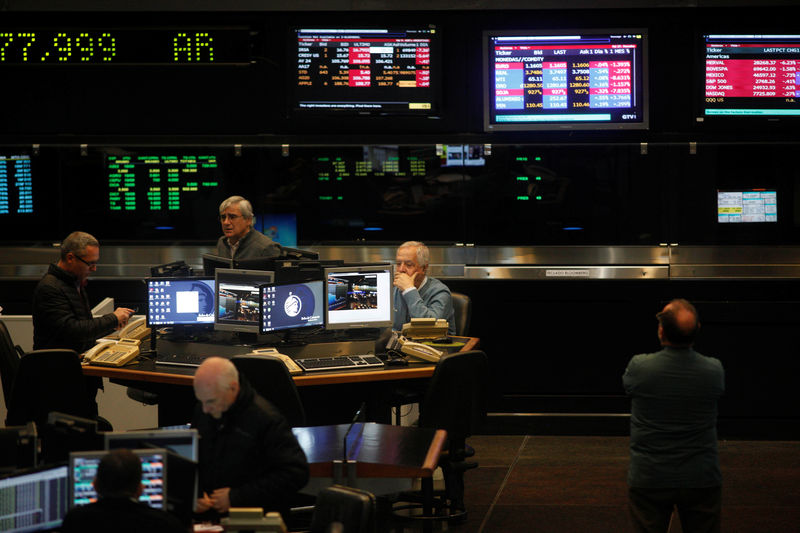By Claire Milhench
LONDON (Reuters) - Emerging markets have seen a brutal first half of the year, with stocks down almost 8 percent, swathes of currencies and bonds hit by a rampant dollar, and escalating trade tensions taking their toll.
Yet given the underlying solid fundamentals across emerging markets, fund managers say this could be just a temporary shakeout - provided the surge in the dollar subsides.
Argentina and Turkey have put the largest dents in portfolios as their currencies have fallen 30 percent and 17 percent respectively. But few others were spared in the widespread bloodletting.
MSCI's widely-tracked emerging market equities index (MSCIEF) is down almost 8 percent this year, while global equities are flat year-to-date (MIWO00000PUS).
Local currency emerging market bonds have fallen 6 percent and dollar-denominated emerging debt <.JPMEGDR> is down 5 percent in the first half, after returning 14.2 percent and 9 percent respectively for the whole of 2017.
(GRAPHIC: Emerging market stocks tank 10 percent in H1 - https://reut.rs/2Ky0MAy)
(Chart data to June 28; EM stocks rebounded on June 29)
"U.S. rate hikes, a stronger dollar, the rise of the oil price and the increased trade fears created a cocktail where capital was less willing to stay in emerging assets," said Valentijn van Nieuwenhuijzen, chief investment officer at NN Investment Partners, which has some 240 billion euros in assets.
"For now, this is not something that we expect to be really the start of a sustained downshift in emerging markets growth or a sustained sell off in emerging market assets," he said.
Emerging equity funds are still in positive territory year-to-date, with net inflows of $50.2 billion, according to data from research house EPFR Global, ahead of the $42.3 billion invested in the first half of 2017.
But pain has been taken on the debt side, with some $9.42 billion pulled from emerging market bond funds in the year to June 25, compared with net inflows of $43.9 billion in the first half of 2017.
Salman Ahmed, chief investment strategist at Lombard Odier Investment Managers, said all eyes were on the dollar's next move.
"The recovery can happen more quickly than in 2013 and 2014 as the underlying fundamentals of EM are stronger. But the noise on trade wars and upside pressure on the dollar need to stabilize for those fundamentals to reassert themselves."
(GRAPHIC: EM bonds H1 2018 performance - https://reut.rs/2tEiNqr)
Pressure started mounting when U.S. President Donald Trump launched concrete plans for tariffs against imports from China and other major trading partners, prompting a swift response and fuelling worries a potential trade war would crimp global economic growth.
A hawkish U.S. Federal Reserve has added to the strains, with the dollar index (DXY) pushing to an 11-month high and 10-year Treasury yields (US10YT=RR) topping 3 percent for the first time in seven years in May.
The latter prompted a wave of selling, hitting Turkey and Argentina, two countries with high external borrowing requirements, the hardest. Central banks in both countries were forced into hefty emergency rate hikes to prop up their freefalling currencies. Argentina also sought IMF help.
Turkish stocks (XU100) <.dMITR00000PUS> are down some 32 percent year-to-date in dollar terms - the worst performer across the main MSCI 24-country emerging markets index.
(GRAPHIC: EM stocks H1 2018 performance - https://reut.rs/2tDschX)
The Philippines (PSI) <.MIPH00000PUS> saw equities plunge some 24 percent as the peso tumbled to a 12-year low, with foreign investors pulling about $1.2 billion in shares from February 1 to June 20.
South African stocks (JTOPI) also lost about a fifth of their value, battered by poor economic data and concern over power outages following wage protests at national electricity provider Eskom. The Brazilian (BVSP) and Indonesian indexes (JKSE) matched those falls.
And there was little solace to be found in currencies. Aside from the falls in Turkey's lira
(GRAPHIC: EM FX H1 performance - https://reut.rs/2NaEzu7)
"The dollar's roughly 5-percent gain since late January has triggered a bloodbath in emerging markets, led by Turkey, Argentina, Brazil and South Africa," said Jan Bopp, an investment strategist at J Safra Sarasin, adding that the overvalued lira and peso had been "screaming shorts" at that time.

Turkey is set to stay in the spotlight after elections delivered a victory for President Tayyip Erdogan. Investors are waiting to see what impact the self-styled "enemy of interest rates" could have on monetary policy and how much reform progress will be made.